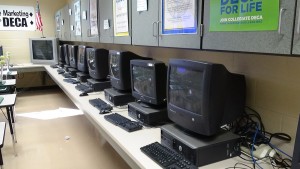While debates continue on whether the Internet should be regulated or how to how to create laws to control online content, Tennessee school systems have already created policy to protect children from Internet dangers in schools and libraries. However, the website filter used by Cumberland County Schools creates some logistical problems for teachers and high school students doing research on campus.

The Cumberland County Board of Education in Crossville, Tennessee developed a very detailed “Use of the Internet” policy, which outlines how employees and students are to use online resources. Guardians and students must sign forms at the beginning of each school year to allow children to use the Internet on campuses. School employees regularly monitor how students use online resources and electronic devices during instructional time.
In 2000, Congress established the Children’s Internet Protection Act (“CIPA”) to limit minors’ contact with inappropriate material. Schools and libraries receive discounts for Internet service when they show CIPA compliance.
In their policy developed as a response to CIPA and Tennessee Code 49-1-221, the board also identifies the schools’ use of “technology that blocks or filters Internet access (for both students and adults) to material that is obscene, child pornography or harmful to students.” In Cumberland County, schools contract with Education Networks of America, an Infrastructure as a Service (“IaaS”) provider, to filter websites that are considered inappropriate for children.
Storme Davis, an English teacher at Stone Memorial High School in Crossville, said, “I agree with the filter. I understand because I’ve taught seventh and eighth grade most of my career, and there are some things they shouldn’t see. It’s better to err on the side of caution.
“However, I went to an education site this year that was blocked,” said Davis, “and some book review sites have been blocked. Why would they be blocked? My students have been studying ‘The Great Gatsby,’ and one of my students wanted to compare Kim Kardashian with Daisy Buchanan. What a great idea, but she couldn’t find an article from ‘People’ because it’s pop culture. Everything related to pop culture is blocked.”
Kim Wattenbarger, librarian and media specialist at Stone Memorial High School, said, “I find the filter very restricting. Students in criminal justice class can’t look up information about guns that law enforcement officers carry. And culinary class can’t research knives used by chefs. Even song lyrics may be blocked from students who are in the history of rock class.
“When the senior English students are giving speeches about toughening laws on child pornography or gun control, they are blocked at school from doing research. And many do not have print capabilities at home, so they can’t bring their research to school.”
Wattenbarger said that students can find information on the Tennessee Electronic Library, but this free service focuses on scholarly resources, which may limit some investigations.
“I understand why the system uses the filter, but it’s restrictive to high school students who are doing legitimate research,” Wattenbarger said.